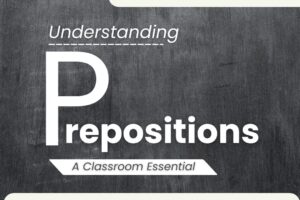
English is one of the most widely spoken languages in the world, with over 1.5 billion people speaking it as their first or second language. It is the language of business, science, and technology, and it is also the primary language used in international communication. A strong vocabulary is important for standardised tests like the SAT, TOEFL and IELTS. As such, having a good command of English and a strong vocabulary is essential in today’s globalized world.
English and vocabulary are essential for success in the TOEFL exam, as it assesses a student’s proficiency in various aspects of the language. One of the critical components of the TOEFL exam is the reading section, which requires students to read and comprehend academic passages. The listening section of the TOEFL exam tests a student’s ability to understand spoken English in academic and non-academic contexts. A broad vocabulary is crucial for success in this section as it allows students to understand and identify the meaning of words used in spoken English.
In the speaking section of the TOEFL exam, students must be able to articulate their ideas and opinions on a given topic, use appropriate vocabulary and grammar, and maintain coherence and cohesion in their speech. Finally, in the writing section of the TOEFL exam, students must be able to use a wide range of vocabulary and idiomatic expressions to create well-written essays that demonstrate their proficiency in written English.
List of must-know TOEFL Vocabulary Words
| Word | Meaning |
| adamant | adj. determined not to change a decision or opinion; unshakeable |
| aggregate | n. assembled or combined into a whole or mass |
| arduous | adj. involves tremendous effort and energy; difficult and tiring |
| bashful | adj. shy and hesitant; avoid drawing attention to oneself or being noticed |
| bestow | v. to give something as a gift or tribute |
| blandishment | n. Pleasant words or actions intended to persuade; coax |
| circumvent | v. to get around or overcome something |
| cohesion | n. state of working or sticking together |
| contemplate | v. to consider or view as a possibility; to study or think carefully and thoroughly |
| dearth | n. scarcity or lack or short supply of something |
| distort | v. to become out of shape or misshapen; to give a false or misleading account of |
| eloquent | adj. fluent, persuasive and clearly expressed through speech or writing |
| epitome | n. a perfect or ideal example that represents something |
| exemplary | adj. serving as an ideal example to imitate; deserving respect and admiration |
| fetter | n. chain or shackle used to restrain a person, usually placed around the ankles |
| fluctuate | v. to vary irregularly; to waver; to rise and fall irregularly |
| galvanise | v. to stimulate sudden activity or take action |
| gullible | adj. easily deceived, fooled, or believes everything anyone says |
| haphazard | adj. lacks planning, organisation and is not thorough; chaotic and random |
| hubris | n. excessive, unreasonable, or foolish pride and self-confidence |
| hypothetical | adj. based on an assumption or imagination as for understanding or discussing |
| ignominy | n. dishonour; disgrace; public embarrassment or shame |
| intrepid | adj. brave; fearless; endurance |
| irony | n. expression in which you say the opposite of what you intend for humorous effect |
| jargon | n. special language, dialect used exclusively by a group, often a certain profession |
| jibe | v. make taunting or mocking remarks; to agree with someone or something |
| jocular | adj. amusing, playful, or witty |
| keen | adj. showing interest, eagerness or enthusiasm; having a sharp and fine edge |
| knotty | adj. full of knots; complicated or complex; difficult to solve |
| legitimate | adj. as per the established law or legal rules; real, genuine or authentic |
| lethal | adj. extremely harmful or dangerous enough to cause death |
| ludicrous | adj. very foolish or ridiculous; unreasonable |
| menace | n. act of threatening; perceived threat or danger |
| moratorium | n. suspension or temporary prohibition of an ongoing activity |
| morose | adj. ill-tempered; sulky and gloomy |
| niche | n. a place, position or activity in life for which a person or thing is best fitted |
| novice | n. one who is new or inexperienced in a particular subject or situation |
| nuisance | n. something or someone that causes annoyance, trouble or inconvenience |
| obdurate | adj. stubbornly persistent; refusing to change opinion despite what others says |
| obviate | adj. to avoid or prevent (difficult situation or something undesirable) |
| paramount | adj. of the highest importance; supreme |
| permeate | v. to enter and spread throughout |
| quandary | n. a state of uncertainty and hesitation; a dilemma; a difficult decision |
| quirk | n. an unusual or strange aspect about the manner or style of something or someone |
| redolent | adj. having a sweet scent; fragrant or aromatic; suggestive or reminiscent scent |
| reminiscent | adj. tending to bring some memory or remind something |
| scrutinise | v. to examine something closely with great care or detail, as to look for hidden flaws |
| simper | v. to smile in a foolish, coy and self-conscious way |
| subtle | adj. fine and precise as to hard to analyse; barely noticeable |
| tantamount | adj. equivalent in meaning, significance, or effect |
| tutelage | n. state of being a guardian, protector, authority or instructor |
| unilateral | adj. done by or affecting only one group or one side of the subject |
| vantage | n. a place or position affording some favourable situation, opportunity, advantage |
| vital | adj. extremely necessary or essential for the existence of something; life-giving |
| wholly | adv. completely and entirely; to the fullest extent |
| xenocurrency | n. a currency traded in a market outside its country of origin |
| yearn | v. to long for something or someone from the past |
| yore | n. time in the past, or of the past; time long past |
| zephyr | n. a light refreshing wind; fine and light quality fabric |
| zealous | adj. showing enthusiasm and eagerness; full of zeal or energy |








